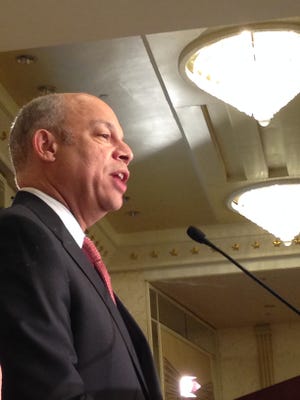Homeland Security sees results focusing on riskiest travelers

WASHINGTON -- The secretary of Homeland Security said Friday threats to aviation remain a major concern, but that scrutinizing "unknown" travelers the most at airports is yielding results.
"Much of our concern continues to center around aviation security," Jeh Johnson told about 250 people at the Aero Club of Washington, with screening tightened last July and again last week. "We're looking at doing more in the short term, in reaction to some of the threat streams we're seeing now."
Johnson said he supports Customs and Border Protection's pre-clearance facilities overseas, which allow customs and immigration screening at the foreign airport.
Airports in Canada, Ireland, the Caribbean and Abu Dhabi screened 16 million travelers last year. Airlines and unions have criticized the Abu Dhabi facility that opened last year because no U.S. airlines fly directly from there.
But Johnson supports the facility, saying it screened 290,000 travelers and prevented 450 from getting on planes, "including several in the terrorist-screening database."
Johnson said the department wants to expand the program to more airports, and received interest from 25 locations last year.
"It's actually popular with the traveling public. It's an opportunity to screen people more before they get on the plane toward the U.S.," Johnson said. "We want to move forward on that."
He couldn't say whether all pre-clearance facilities revealed as many travelers forbidden to fly to as U.S. than Abu Dhabi has. But he said he would prefer to defend the homeland in foreign countries rather than at domestic airports.
"I do know that we're seeing considerable productivity in terms of the level of screening," Johnson said. "It's a good model for aviation security and homeland security."
U.S. airport security in recent years has focused its greatest screening efforts on "unknown" travelers. For example, fliers who provide personal information for "trusted traveler" programs often receive expedited screening at U.S. airports, and at international screening and customs checkpoints. The department contends that airport security officers to focus their greatest efforts on the remaining highest-risk fliers.
TSA set a record last year seizing more than 2,100 guns at airport checkpoints. Johnson credited the increase to focusing more on travelers the authorities know less about.
"That number is astounding to me," Johnson said.
He visited the Atlanta airport last week, after authorities charged airport workers with smuggling guns by avoiding passenger security. He asked airports and airlines to evaluate other methods for improving security.
"It's a hole we need to plug," Johnson said.
Despite complaints about the visa-waiver program, Johnson said the answer isn't to cancel a program that eases legal commerce between friendly countries. The concern is that terrorists with passports from a visa-waiver country, such as one in Europe, could get to the USA easier.
Johnson said extra questions were added in November to the electronic forms used for visa-waiver travelers, but that his staffers are studying other steps.
"Some are concerned about that program because many of these countries are countries that also have a foreign-fighter concern," Johnson said. "The answer is not to discard the visa-waiver program."